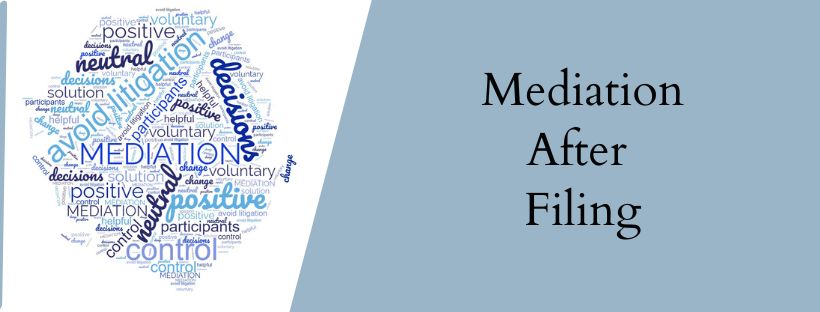
Goal
Assisting in resolving family court conflict to avoid lengthy, expensive litigation
- Assist the parties in reaching solutions that are beneficial and practical for your family
- Create a complete document that outlines the solution to each of the issues
- Save time and money while preserving relationships and confidentiality
Process
Gather information and collaborate between the parties to address all issues
- Relay information to ensure individuals make informed decisions
- Parties make decisions and determine the outcome
- Create effective solutions for the unique and individual needs of the family
Outcome
Reach an agreement or receive documentation that mediation was completed
- Reach an agreement as to all issues for the court to approve, avoiding expensive litigation
- Mediation is mandatory in family court, and proof of completion is provided
- Allow the parties to maintain some control over their situation and their future
What is mediation after filing with the court?
Mediation after filing with the court is a mandatory process that allows the participants to work with a mediator to reach a compromise and resolve conflict.
The issues can be related to parenting, paternity, custody, child support, visitation, medical insurance, alimony, debts, assets, and separation or divorce.
During the process of mediation, parties not only explain their positions and thoughts but also their opinions.
Mediation occurs in a setting that encourages good communication.
What is a mediator?
A mediator is a neutral third party who can help you and your former partner or you and other persons (grandparents or other relatives) identify and discuss issues. Additionally, the parties work on possible solutions.
The mediator does not take sides or make decisions for you. As the mediator cannot make a binding decision, the parties involved feel less pressure and stress.
While the mediator will help you arrive at an agreement, in the end, the participants make the decisions.
If the parties are represented by attorneys, the attorneys will guide their clients legally and give them advice to protect their interests.
Why should you mediate after filing with the court?
Mediation is mandatory in the state of South Carolina. Contested cases must complete mediation before a final hearing is scheduled.
The main reason to mediate is that you can make decisions for your future, as opposed to having a stranger make those decisions for you.
You can address things in mediation that the court may not focus on.
You can structure an agreement that takes into consideration the needs of your family.
The mediation process can produce a much better outcome for all parties involved. The process can allow you to move forward with greater ease and clarity for yourself and your family.
Further, mediation is less expensive and takes less time than a contested family court battle. The process results in a better long-term relationship.
Mediation can be easier on children since the process is more peaceful and amicable.
When you go to court, you are putting your life and future in the hands of a judge that has limited knowledge as to your best interest or the best interests of your child(ren).
You can mediate prior to filing with the court or you can mediate after filing.
Is mediation after filing confidential?
Mediation conferences are private and all communications made there are confidential. No information from mediation can be used in court.
How is mediation different from going to court?
Mediation allows the parties to control the resolution of their disputes. Because the parties control the process, their views and concerns are heard and acknowledged.
Mediation helps the parties to reach resolutions that they may not have considered or that may not be commonly used in court, which gives the parties a more beneficial outcome.
In mediation, the parties reach their own agreement, which helps limit future problems.
A successful mediation can result in a quicker resolution of disputes at a lower cost, and court time is minimal.
Court time is minimal, as it is only necessary for the approval of the mediated agreement rather than a contested hearing.
Who can attend mediation after filing with the court?
Only parties may attend mediation. No other individuals may take part in the process without first obtaining approval from the opposing parties, opposing attorneys, and the mediator.
How long does mediation after filing take?
Mediation is typically scheduled for a minimum of three (3) hours and up to eight (8) hours per day. Some cases, though rare, may be scheduled for more than one (1) day.
The length of mediation can also be affected by how much discovery has been completed.
Is everyone in the same room or in separate rooms?
Based on the circumstances of your case, a determination will be made that best promotes open communication and compromise.
Can you do mediation after filing virtually?
Sessions can be held via Zoom. Your mediator will send you a secure link to log into your mediation room.
The format allows for everyone to be in the same room, be in a room with just the mediator, or a combination of both.
Third parties are not allowed to be in the room except your attorney.
Do we still have to go to Court?
Once the parties reach an agreement and the agreement is signed, the court must approve that agreement. If you need a divorce, the divorce must be granted by the Court.
What does mediation cost?
The cost for mediation varies depending on the number of issues, the complexity of your case, and the amount of time necessary to mediate.
The rates of the mediator vary based on the experience of the mediator.
How many hours should I be prepared to pay for?
Please be prepared to pay for a minimum of four (4) hours of the mediator’s time.
The mediator must spend time prior to the mediation reviewing the documents and issues of the case.
Additionally, after the mediation concludes, the mediator must provide a written report to the court.
How do I pay for mediation after filing?
When mediation occurs after filing with the court, the costs are due the day of mediation unless the court requires different payment arrangments.
Some parties are required to put the money for the cost of mediation in their attorney’s trust account prior to mediation.
Mediation can be paid for by cash, check, or credit card. You may also pay via the Lawpay link shown at the bottom of this page and the home page.
Who pays for mediation after filing?
Court rules require the equal division of these fees unless otherwise agreed upon or the court issues an order directing payment.
Can a Mediator provide legal advice?
Mediators can give you information about state laws and local court procedures but cannot give legal advice. Mediators do not interpret statutes or advise about or recommend any specific legal action that would benefit either party over the other.
What happens if we do not settle in mediation?
In the absence of a settlement, the parties lose none of their rights to trial in Family Court. You will receive a document that provides proof of completion of mediation and lists the contested issues.
An agreement can be prepared on the resolved issues if all parties consent.
You have the option to have your attorneys continue to negotiate on your behalf and go to court on the unresolved issues. Alternatively, you can return to mediation for another session to resolve the conflict.
Sometimes taking a break and returning to mediation can be beneficial.
What type of mediation training or certification is required to be a mediator?
A mediator in South Carolina must have specific educational background and complete a forty-hour course approved by the South Carolina Bar Association. Additionally, the certification is maintained annually through the South Carolina Alternative Dispute Resolution Commission.
If you have not filed with the court and want to participate in mediation before filing, learn more.
Have questions or need assistance? Contact us.
